Ed Ryder's Blog, page 3
July 5, 2017
Do authors ‘owe’ their readers?
[image error]With the new season of Game of Thrones about to unleash itself on a ravenous and insatiable fan base, I thought it would be an apt time to explore the relationship between author and reader, in particular reference to book series. Do authors really owe their readers and fans the next novel at the expense of everything else, or are we a just a bunch of self-entitled content junkies demanding our next fix?
Like many people, I love a good series of books, whether they tell a new story with existing characters, or carry on the plot where the previous story left off. If I love the characters and the world, I want to spend as much time as possible in there, and I always want to know what happens next. [image error]
As individual books have a beginning, middle and end, so does a linked series. In your average trilogy, the first book will be an introduction, but will probably have a good sense of closure in case the other two are never written. Writing a proper ending to your first novel, even if it is an open one, is a really good idea if you’re a new author. We all have our grand plans of a Lord Of The Rings beater, but the reality of low sales and the huge time commitment needed means that many an epic lies forever as smudged scribbles in a dog-eared notepad. There’s no better way to annoy readers and lose them forever than to never offer them any closure. Even an end you disagree with (*cough* Lost) is better than none (see the V remake from my last post, or Terminator: The Sarah Conner Chronicles).
[image error]When you get on to writing book two in the series, however, things start to get a bit more complicated. Plot threads are picked up and expanded upon, the cast and universe grows and suddenly you’re at 90,000 words and nowhere near a conclusion. The obvious solution is to finish with your characters in peril, or with an epoch-defining event on the horizon. Readers and bloggers up and down the internet will be chomping to know what happens next; a guaranteed audience for part three! Win!
And that’s where the problem starts. Below are two arguments and some nice devil’s advocate bias from me on both sides.
Case for the prosecution: “We made you! You owe us!”
[image error]I remember, many years ago, watching a news report on Hollywood stars complaining about their privacy being violated by the paparazzi. One of the accused photographer’s response to this was (paraphrased) “When they were starting out, they were begging us to take their picture. Now it’s time for us to collect on the debt.” And I do think the guy had a legitimate argument, up to a certain point, anyway. The wannabe stars had either wittingly or unwittingly entered into a contract with the press for their souls and privacy, and the photographers wanted their pound of flesh at the end of it.
In the case of separate stories from the same author, as a reader you are buying a book, and once it’s over, that’s it. If you’re lucky there will be a new tale on the shelves in a couple of years, which may or may not tickle your fancy. With a series, however, the author is saying to the reader: “Hey, come on this journey with me!” As an author, you’re asking the reader to invest in not one book, but several, sometimes over many years. You want them hooked in and buying those hardbacks as soon as they hit the shelves, to get those pre-orders whizzing you up the Amazon charts for even more exposure to new readers. You’ve instantly raised readers’ expectations and therefore the responsibility to manage them effectively (for example, giving regular updates or putting other projects to one side until the series is finished). If you’re getting rich or popular from the endeavour, then yes, you do owe readers the next book and a return on their investment, both in money and the extra word-of-mouth advertising boost they almost certainly gave your stories on social media.
George R. R. Martin gets a lot of stick for the time it takes to release books, but it’s not exactly an edge case. I’ve been waiting for the 4th Abarat book from Clive Barker to come out since 2011 as well, and it’s been 23 years since Everville and still little news of the third Book of the Art. Imagine if J. K. Rowling had announced she was taking a break from writing Harry Potter novels after book 5 for a few years while she focused on other projects? I think the internet would have melted.
Case for the defence: “I ain’t your property!”
[image error]
On the other side of the coin, authors are not slaves, chained to the desk twenty-four seven until they churn out that book you so crave. As mentioned above, writing a book takes a long time. As a series progresses, the books tend to get larger and take even longer to write. If the series becomes popular, then the author may spend a larger proportion of their time promoting it and less time at the desk. Personally, I love a good long-haul flight to a scientific conference because I have about 10 hours of uninterrupted writing time, but many authors only write in their sanctuary at home.
Even so, the real question is “why should they do what a possibly vocal minority demand?” Nothing seems to annoy a rabid section of the fan base than an author daring to work on a side project instead of finishing what they’re ‘supposed to be doing’. But there are several good reasons for doing this, the most obvious of which is burnout. If your mind is stuck in the same universe for years at a time it’s easy to start getting bored and hating the very thing that you hold dear. Everyone needs a holiday, and writing a completely different book or even working in a different medium is a good way to reinvigorate the imagination. Authors often work on several projects at once, so sometimes a different story just takes the fore, or it may have been hanging around for ages and they just want to finish it off. As an example, The Scarlet Gospels took Clive Barker over a decade to write, on and off.
[image error]There’s also the issue of scheduling. Self-published authors can pretty much release books as and when they want, but traditionally-published authors are often at the mercy of the publishers. A hardback book comes out, and several months later after the initial sales have dropped, the paperback print run occurs. A year or so after that, the cycle begins with the next book. So if your favourite author releases a novel that’s not the next one in the series, then even if they’ve finished the one you really want, it’s not going to see the light of day for at least a year or so down the line.
Authors are not at your beck and call. They do not force anyone to read their books, and if a long series of books is planned then it may take decades to complete the story. As a reader, you buy a product and that’s it. Investment is risk, and sometimes not all investments pay off. If you were entertained when you read the latest book, then you got your money’s worth. Anything you think you are owed in addition to that is your problem.
The verdict.
[image error]
So there you have it. Do authors owe us or are readers just being obnoxious in our constant demand for content? As with most things, the truth is somewhere in the middle, for me at least.
It’s true that no one forces anyone to buy into a book series and readers undoubtedly enjoy the content and get value for money, otherwise they wouldn’t be so excited about the next one. Authors need time and space to get the job done, and make their work as good as it can be. Personally, I’m prepared to wait longer for a high-quality product (up to a point, anyway).
Authors, however, also have to appreciate that they’ve raised expectations that the story they started to tell will be finished in a decent time frame (or indeed, at all), and they’ve asked the readers to come on a journey with them. You’ve inspired loyalty in your fan base in a world where there are a million other things they could be doing or spending their money on. Don’t take it for granted that they’ll still be there for you a few too many years down the line.
So what’s your opinion? Let me know in the comments section below!
Ed Ryder is a research scientist by day and writes in the evening when he can fit it in. Morula, the sequel to Why She Ran is now in production!


June 30, 2017
My female hero – V’s Juliet Parrish
[image error]
With Wonder Woman getting so much attention from the media, grandly declaring her debut solo film as ‘at last, a female action hero!’ (an accolade which was quickly derided on social media with lots of photos of Ripley, Buffy, Xena, Sarah Conner et al), I thought I’d go back and share some thoughts on my own female hero from my youth – V’s Juliet Parrish.
I’m a bloke, but I’ve always found female characters much more interesting than male ones. Part of this comes from their complexity; a story is much more likely to explore the more emotional, conflicted and vulnerable parts of their character than with male action roles. But before I get into the why, for anyone who never saw the original V series, here’s a quick recap.
What was V all about, anyway?
[image error]Made in the early 1980s and set in what was then present day, V explores what happens when humanity is suddenly host to a fleet of UFOs. The aliens, called the Visitors, look just like us and proclaim they come in peace. They’re willing to share their technology and expertise with us, and all they require in return is some materials that we don’t need anyway.
It soon becomes clear, however, that they have a hidden agenda and soon Earth starts resembling a totalitarian state, fueled by an alleged conspiracy by a group of scientists who are determined to kill the Visitors. But why are the aliens so scared of anthropologists in particular — what secret are they trying to hide? Juliet Parrish, a medical student, gets drawn into discovering the truth and starts a small resistance group to fight back.


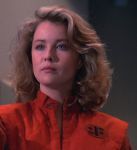
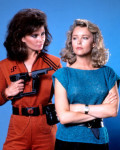
Juliet Parrish – a reluctant leader and hero of the Resistance.
Growing up in the 80s, we had a vast selection of action heroes to look up to, but most of them were muscle-bound Goliaths using pure strength to get things done. I love Arnie films as much as the next person (probably a lot more, actually), but the characters weren’t really that relatable to a skinny, scifi computer nerd such as myself.
In V, however, the main character (at least in my eyes — it’s an ensemble piece really) is a scientist / doctor, just like I wanted to be. Juliet starts the Resistance with a group of friends and neighbours, spreading out contacts and eventually forming an alliance with reporter Mike Donovan, who has seen the Visitors close up. She is ill prepared for what awaits her as a leader at first, taking too much responsibility on her own shoulders, but grows into the role with the help from others. She cares deeply for all members of the group and is deeply troubled when one of their first attacks goes badly.
[image error]OMG spoilers! (seriously, it’s 34 years old now)
As the Resistance movement grows in numbers, equipment, and scope, she starts to plan operations to disrupt the Visitors’ grip and expose the truth to the world. She’s also not afraid to lead from the front, culminating in one of the best parts of the series, where the Resistance attacks a televised function to reveal the Visitors’ true form. Juliet is captured and tortured by the beautiful and deliciously evil Diana (whom, on reflection, probably triggered my life-long fascination with attractive, psychotic women), who heads the science division of the Visitor fleet. She attempts to brainwash Juliet, a process called ‘conversion’, but Juliet is rescued before the process completes.
[image error]Diana, probably thinking about something evil
After her failed conversion Juliet manages to keep the loyalty of the group despite a challenge from militant Ham Tyler (played by Michael Ironside, who is awesome as ever!). After a series of events involving an cross-species breeding experiment devised by Diana, Juliet’s scientific expertise comes to the fore again when they try to develop a biological weapon to use against the Visitors. Despite a successful test, she refuses to use it until the aliens who have turned against their leaders and who are helping the Resistance are protected, despite enormous pressure from Ham and the others.
Juliet in many ways is an idealistic hero, who tries to do her best for a cause she believes in and for the people around her. In many stories today where our protagonists (including my own) are often flawed people living in shades of morality, it’s sometimes refreshing to root for someone who embodies traits and a vision to aspire to.
V – The good, the bad, and the remake.
V is certainly a product of its time, and as a result some of the special effects are a bit dodgy (for example, the bit with Diana and the guinea pig is more comedic than shocking now), along with the fashion. Also, the climax at the end suffers from a serious dose of deus ex machina, but if you can look past all that then it’s a great series with a fantastic story. The themes and symbolism are a pretty obvious allegory for the Nazis, but are still very much relevant in today’s social climate.
V was originally broadcast as a two part mini-series in 1983, with the Final Battle three part series being shown in 1984 which wrapped up the story. Then for some reason, they decided to make ‘V – the series’ in 1984 -1985, which was completely dire (seriously, don’t watch it) and doesn’t exist in my version of reality, along with Highlander 2. It was rebooted in 2009 with a new set of characters, but got cancelled after season two, just as it was getting good, and ended on a massive cliffhanger.
As an added bonus, here is one of my favourite bits of dialogue from the series, between Abraham and his son. I tried to find a clip of it on YouTube but failed, but the performance never fails to put a lump in my throat.
Abraham Bernstein: Stanley, you don’t understand. They have to stay. They need a place to hide!
Stanley Bernstein: And why is that?
Abraham Bernstein: Because the father is a scientist.
Stanley Bernstein: And therefore suspect! And a fugitive, I take it, which would make them doubly dangerous.
Abraham Bernstein: They have to stay.
Stanley Bernstein: And I’m telling you to get them out, before I…
Abraham Bernstein: I won’t.
Stanley Bernstein: Then I will!
Abraham Bernstein: [shouts] No, you won’t! We had to put you in a suitcase. In a suitcase! You were eight months old. That’s how we smuggled you out.
Stanley Bernstein: I know the story!
Abraham Bernstein: No, you don’t! You don’t. Your mother, auv shalom… your mother didn’t have a heart attack in the boxcar. She made it with me, to the camp. I can still see her, standing naked in the freezing cold. Her beautiful black hair was gone. They’d shaved her head. I can still see her waving to me, as they marched her off with the others to the showers – the showers with no water. Perhaps, if somebody had given us a place to hide… don’t you see, Stanley? They have to stay. Or else, we haven’t learned a thing!
Ed Ryder is a research scientist by day and writes in the evening when he can fit it in. Morula, the sequel to Why She Ran is now in production!


June 8, 2017
The Sunshine Blogger Award: An interview with Rowena Schoier
[image error]
I’ve been nominated by Debbie Jinks for the ‘Sunshine Blogger Award’, where a character in one of my novels has to answer ten questions about themselves. I’ve chosen Rowena Schoier, the wife of Caden, a politician in the Ministry of Reproduction. She has her own plans for the fate of the world.
1. Do you think your author should have given you a special talent like being a time traveller, or a mathematical genius for example? (Depending on his/her writing genre).
The power to influence minds directly would be most appreciated. Doing it the long way around can be very time consuming and bothersome.
2. Does your author think she’s in control or can you make him do your bidding?
Ed always does what I tell him to. There are several things that happen in my novel that he had never even thought of until I had whispered them in his ear. I am the hero, despite what he may think.
3. What is your least favourite character that he has written into the story?
Joe Parker. A most abrasive and unpleasant character; an old-fashioned creature and a relic of times before the Death. He seems to think that women belong in the bedroom or the kitchen; certainly not anywhere near a position of power. If ask him to do something, he looks over to my husband, Caden, for confirmation. It is a pointless diversion; Caden always does what he is told.
4. If you could be a different character who/what would you be?
No one. I have everything I need right here, and my path has been set by God himself. I can find no other explanation for what happened to the world, and how I benefited so much from it.
5. Do you like the world he has built around you? If not what would you change about it?
I would not be in the position I am if it was not for the world he built. The Norwegian Death killed half of the population of the world several decades ago, changing our civilisation forever. Britain remained strong, and our discovery of a new antibiotic made us the richest nation in the world while the other countries floundered. My father was a common man, a scrap dealer from the north of England. He realised that computers and complex electrics would soon be a thing of the past without the infrastructure and technology to drive them. So, he started converting cars to old engines which did not need them, buying up every scrap yard he could find to grow his empire. He became one of the richest men in the country, and sent me to the best schools and the best tutors, so I could meet men of influence when I was old enough. Only Dr Victor Pearson is richer, but he invented the cure for Infectious Embryonic Sterility, the virus that made the children of the survivors infertile. It was the deal his company made with the Government which made the In Vitro Lottery possible.
6. Has he given you a lover? Are you happy with her choice?
My husband is Caden Schoier, a junior member of the Ministry of Reproduction. His family has a history of making difficult decisions, like his uncle Alfred, who masterminded the solution they called Prisoners Dilemma during the plague. I have big plans for Caden, and our future dynasty. I have the money, and he will soon have the power. A perfect combination.
7. If you could change one thing about yourself what would it be?
I have everything I desire but I get lonely sometimes, despite the vacuous sycophants who flutter around me. I need an equal to myself, a friend whom I can discuss ideas or debate strategies with. Someone who understands what must be done.
8. Do you think she has made you sound pretty/handsome or should she have worked harder on that?
I am young, blonde and beautiful, which makes men (and many women) underestimate me. I walk the corridors of power in the Ministry, pretending to a be a mere trophy, all the while bending its will to mine with just a well-timed smile or a quiet word in an eager ear. Men are easy to manipulate when they desire you, and most of them do.
9. What habit does your author have that really irritates you?
He keeps making me say things with contractions (a lady of standing does not talk in such a way), and then has to edit them afterwards when I complain. That, and he keeps describing me as the antagonist to other people – how rude!
10. Do you think your author is a talented writer? Or could he do with taking a few courses?
He uses far too many adverbs in dialogue for my liking; something he is working on for my further adventures, so I am told. But he built the world I live in, making it come alive with details and observations on how a civilisation functions and rebuilds after such a catastrophe.
Who’s next?
Part of the chain is to nominate people with your own questions, so here’s mine!
Tell me about the world you live in.
You have only $50 left (or local equivalent) in the world, what do you spent it on?
What scares you the most?
What would your ideal alternative career be?
Slay the dragon or set it free? (and why)
Would you join an old enemy to fight a new one?
What do you do to relax between adventures?
Has your author ever made you do something you completely disagree with?
Are you in love with anyone you shouldn’t be?
Would you take a life to save ten?
I nominate the following people (links coming soon!):
Mark Roman
Karl Drinkwater
S. A. Gibson
David Gilchrist
A. M. Rycroft
K. A. Duggsy


May 3, 2017
In Vitro Lottery
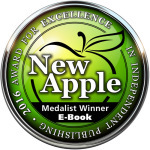
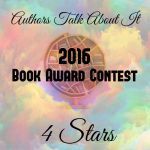
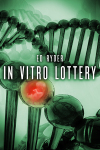
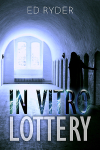
Imagine a future where the population has crashed, civilisation is crumbling and gene editing is the only way to have children. Would your ethics, views and beliefs still be the same, and would you trust those in charge to do what’s best for humanity, no matter the cost? Welcome to In Vitro Lottery, out now on Amazon!
Decades after a deadly plague has ravaged the world, the children of the survivors can only reproduce via complex fertility treatment. Some can afford it, but for everyone else there is the In Vitro Lottery.
Kate Adams never really wanted a family so she gives her winning ticket to her sister, with tragic consequences. Desperate for answers, Kate suddenly finds herself forced out of her own insular life and sent on a dark interwoven path with the clinic head Victor Pearson and the pressure group IVFree in her pursuit of the truth.
What dark secret lies beneath the surface and purpose of the Lottery? And when the fate of humanity is at stake, who really controls the future, and what will they do to protect it?
Amazon reviews for In Vitro Lottery!
[image error] [image error] [image error] [image error] [image error] [image error] [image error]


Why She Ran
[image error]
Imagine a future where the population has crashed, civilisation is crumbling and gene editing is the only way to have children. Would your ethics, views and beliefs still be the same, and would you trust those in charge to do what’s best for humanity, no matter the cost? Welcome to Why She Ran, out now on Amazon!


February 4, 2017
Ruining the reputation of self-publishing: an amateur writer, one year on.
[image error]Before we start, apologies for the clickbait title. Is there’s one thing I’ve learnt in the last twelve months it’s that negative headlines get a lot more attention than positive ones. You clicked on it, after all!
But what else have I discovered in my voyage into the minefield-strewn world of writing and book marketing, and how was In Vitro Lottery received (if at all) by the reviewing and buying public? Read on to find out!
Pond scum!
[image error]Not long ago, a rather obnoxious blog article was published on a popular news site, in which the author lamented the whole self-publishing industry and how it was destroying the literary world. I won’t link to it here because the person who wrote it got all the publicity and controversy she was craving for at the time, but I’m sure a Google search will pick it up. As I was reading the section on ‘how dare people without years of training or an agent even think about writing anything using their claw-like vestigial hands and poorly evolved brains’, I couldn’t help but think “hey, I’m exactly the person they’re talking about!” So that was nice.
Many writers (even self-published ones!) take years to hone their skills before they release anything. They join writing clubs, form a core of beta readers and editors, and have proven and focused marketing plans for their products. Many of them have made a good living out of it, and a few have reached the very top of success and are now household names. And good luck to them! To be that dedicated takes a lot of work.
As a hobbyist writer, however, I didn’t do any of that. Although retiring from my day job to a world of hot tubs full of supermodels seemed like an attractive proposition, my main drive to writing a novel was “hmm, I wonder if I can write a novel?” I’d had an idea floating around in my head for a number of years, so why not give it a go? I read some articles and books on plot structure and planning (the excellent books by K.M. Weiland were invaluable for this) and away I went!
A year and a half later, In Vitro Lottery was released to an unsuspecting and uncaring world!


Wow, bet that sucked then!
My initial launch was advertised in the small and narrow net of my relatives and some friends on my private Facebook feed. After some initial feedback that the formatting had got a bit munged and there were a few mistakes, I did another edit and sent it off to some bloggers to try and get some reviews. The initial reviews were okay, even the ones from people who weren’t my mum, but there seemed to be lots of room for improvement still.
Third time lucky…
Some authors complain about getting 3* reviews, but the one I got from CommonBookSense was perhaps the most useful one I ever had. They loved the story, the setting and the characters, but found my prose fairly impenetrable. I took this on board and did another round of substantial edits. The first blog to review the new version was Underground Book Reviews back in May 2016, and their review was much more favourable. Since then, a few more proofreading edits have been done and the reception has been much more positive. Don’t believe me? Then try a few of the hand-picked examples below!
[image error] [image error] [image error] [image error]
It’s a truism that you can’t please everyone all the time, and some people will hate what content creators put out, be it books, music, films or art. Although we like to dismiss them as trolls with nothing else to do, sometimes people just don’t like your shit. One person’s pacey thriller is someone else’s drying paint. For example…
[image error]
[image error]
I also entered IVL into a couple of competitions. AuthorsTalkAboutit gave it a favourable 4* review but it wasn’t chosen, but I did win the NewApple Literary Summer ebooks 2016 award for best scifi-dystopia!
Scientist that I am, I had to put in a graph somewhere, so here are the ratings and reviews IVL has garnered over the last year from Amazon US, UK and Goodreads. There is some overlap between the three due to review cross-posting, but not a vast amount.
[image error]
[image error]
So, on the whole, people liked my novel (or at least thought it was okay) which for an amateur was a victory in itself. But did I manage to sell any copies?
Marketing – that which doesn’t kill you, maims you for life.
[image error]
If you’re a famous writer with a built-in fan base then your books will probably sell themselves to some extent, and if they don’t then the publisher’s marketing budget will do the rest. For everyone else, publishing your novel without any plan to sell it is a bit like learning to swim by jumping off an ocean liner.
For the people who have a clue of what they are doing, they ensure that they have a social media presence and network months before they release anything. I waited until after my book had been released, which was far too late. My original plan of ‘maybe someone will recommend it to someone influential while I plumb in the hot tub’ wasn’t paying dividends, so I decided to spend some money on various marketing companies and boost my social media presence.
In my rather limited experience, marketing can be condensed into the following statement:
Promote = sell (maybe). Don’t promote = don’t sell
[image error]The only other major insight I have into marketing is that it’s really, really, depressing and takes an enormous amount of time and effort. Seriously, the thought of having to do it all again for my next novel stopped me writing anything else for nearly six months. It was only when I saw the awesome TV series Westworld that I felt inspired enough to pick up the keyboard again.
[image error]I’ve talked about my experiences with Twitter, email-shot companies and free book promotions in previous posts so I won’t go over them again now. Suffice to say, what works for one genre or author may not work for someone else. The only way to get results is to cast your net far and wide, and see which works for you.
I’m in Amazon KDP select, which I also wrote about previously, so I’ve shown the page reads too. The numbers are very modest and I’m sure that many people shift many more copies a day than I’ve sold in total, but from a starting point of absolute zero I’m happy enough.
[image error] [image error]
In total, so far I’ve sold 250 copies and got another 130 in page reads (using the highly suspect conceit that everyone who started my novel finished it).
If you check the KENP graph, there’s some fairly obvious spikes in there. These correspond to when I’ve done a free book promotion on Amazon and paid a company to advertise it. I’ve done this three times so far, and each time it’s boosted my sales, page reads and reviews. It’s only a short term gain and I’m sure next month will fall back again, but it does help spread the word.
[image error]Getting success long term takes a lot more effort (and a little luck), probably several more books and time. For under every effortlessly gliding duck on the lake there is a pair of legs paddling like mad.
So, to summarise the last 12 month, what did I learn? What horrible mistakes did I make so you don’t have to?
Things wot I found out:
Amateur and hobbyist writers can write novels that others enjoy. I’m nothing special, so if I can do it, so can you!
No matter how ready you think it is, your book probably isn’t ready yet. Get it right first time. You only get one chance to make a good first impression, and a few early bad reviews can kill a book from a new author. I got lucky in this respect and had some time to correct things, but you may not be. Don’t give them an easy way out of a high rating with bad formatting or grammar!
Get your social media (blog, Facebook, Goodreads, Twitter etc) up and maturing before you start editing. The wider your network, the easier it will be to generate interest.
Self-editing and proofreading is really difficult, think seriously about getting it professionally editing before release! Even after my latest minor edit I got a review saying it needs some proofreading. I’m now in the process of getting IVL professionally edited, something I’m doing for my next novel before I release it.
Trying to make money will probably just get you depressed. If you’re a hobbyist writer, then treat it like a hobby. If you think book marketing is expensive, try keeping a horse!
When it comes to social media, give more that you take, especially when first starting out. If you join a group and instantly start plugging your book, you’ll most likely get ignored at best, and flamed at worst.
There’s lots of help and support out there. One Facebook group I find very useful and friendly is the BooksGoSocial Author Group. They also run a separate group for getting and giving reviews.
Good luck!
Ed Ryder is a research scientist by day and writes in the evening when he can fit it in. Morula, the sequel to In Vitro Lottery is now in production!
[image error]


October 26, 2016
My new science blog is now live!
My all-new website, www.gene-editing.org is now live! Do you want to know more about genetics, CRISPR and gene editing? Then come and visit!



New technology is revolutionising the way scientists study the function of genes and genomes. But how does it work, and what are the benefits or dangers?
http://www.gene-editing.org is split into a beginner’s guide to genetics, gene editing and ethics. There is also a news and blog section, discussing the latest in research and, of course, any In Vitro Lottery-related news!


October 8, 2016
Can Twitter help sell my book?
The downside of that, of course, is a massive increase in competition. Instead of a shop with hundreds of books vying for readers’ attention, there are hundreds of thousands on Amazon. It’s a bookstore of near-infinite shelves, and if you’re not at the front table, it’s a journey you have to persuade your customers to make.

So how to make sure that your book stands out and gets people interested?
One way is to advertise. Popular ways of doing this online are Amazon KDP select advertising, Facebook ads, discount / free offer mailing lists and Twitter streams.
Ask other indi authors on Facebook or internet forums which is best and you’ll get lots of different responses. Unfortunately, advice from one person will usually be in direct conflict with advice from another. This is to be expected; what works for one person or genre may not work for someone else. It’s trial and error at the end of the day, to find what works for you.
This all costs money and often the expense unfortunately far outstrips any return. These adverts should be considered long term investments, but even so it can feel like flushing money away into a black hole most of the time.
“She watch channel Twitter”
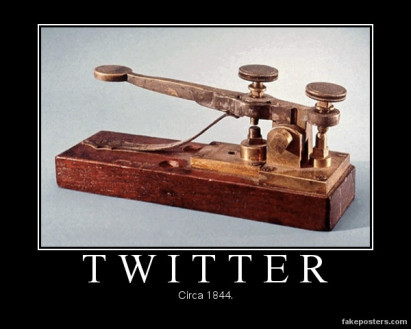
There are many companies offering to advertise your book on their Twitter streams, and costs vary from about $14.99 a month to a lot more. They often boast a huge reader base and the opportunity of selling hundreds of books, usually with testimonials to match. Nothing wrong with that, as long as they are genuine; they are a business after all trying to get your custom.
Not all Twitter-based companies and their channels are created equal, though. Here are some questions to ask and things to consider before choosing one.
Do they publish their overall hit rate metrics? How good are they at driving traffic to pages?
If they do give a figure on their site, it’s often an average rather than the median. It only takes a few really big successes (possibly from authors much further on in their career than you) to skew the numbers beyond manageable expectations.
It’s in their interest to get as many customers as possible (again, nothing wrong with that). The more books they show, however, the quicker your tweet will fall off the bottom of the page. Humans are notoriously lazy and the odds of them stumbling across your book goes down the further they have to scroll. Therefore check how many times a day your tweet gets sent out and at what times. If they have several channels and cross-post, that’s great. But if the tweets all go out at once at 2am then it’s not ideal.
You have no idea how many of their user base actually look at their streams and how often, even if they are ‘real’ Twitter users. I’m a follower of all of the lists I’ve used in the past and rarely look at any of them. I’m part of the problem!
Some companies will write your tweet for you from the book description. This can result in some hilariously out-of-context tweets if you don’t check.
Check if you will get a summary of hits at the end of the advertisement. If you don’t and you don’t sell, you’re still in the dark where the problem may lie.
Is the readership on the stream the correct one for your book? Your sci-fi vampire tale based on an alternate Earth where the Elizabethan period never ended (hey, that sounds good!) may not be the best fit for people looking for a contemporary character romance or Bourne-type action thriller.
It’s worth noting that the best any promotion company can do is get traffic to your Amazon page. After that, it’s up to your blurb, cover and reviews to make the sale.
If people come to your page based on a recommendation then you’re halfway there already. If they’re there on a whim and a click, then it has to be top-notch.
My initial experience with Twitter
I tried a few Twitter companies when I first released In Vitro Lottery with pretty much no success at all. At the time, however, I had little to no reviews and no buzz, so in hindsight that wasn’t totally unexpected.
Now, though, my novel has over twenty reviews on both Amazon US and UK sites, averaging 4 and 4.5 respectively which isn’t bad. It also has 38 ratings on Goodreads. So I decided to give it another try.
One of the companies I currently use is BooksGoSocial (aka YourBookPromoter.com), who offer a variety of packages and tweet duration. Although the tweets run for a week or more, the actual membership lasts a year and includes lots of inclusive extras that many companies charge a premium for. BGS is run by Laurence O’Bryan, who is himself an author in addition to running the business, and he has some great insight on how the traditional and indi publishing world works.
For this experiment I signed up with BooksGoSocial’s ‘Reader Insight Service’ add-on, which is a bit different from their standard offerings. This package would include a month of tweets across all their networks of over 700k users, an initial Skype support call of what things to try, and email support. They also designed a new cover for my book (cover 2, below) and some graphics for the tweets.
The experiment

As a starting baseline, in a month where I’m not promoting it, my book will sell a few copies and get maybe a couple of hundred page reads through Kindle Unlimited. Not exactly retirement-fund worthy, but it is what it is.
The aim of the experiment, therefore, was two answer two questions:
Can general reading Twitter streams get people to my Amazon page?
Do the cover and blurb make a difference to any resulting sales numbers?
For this promotion, I had 4 x 1 week blocks of tweets, so we tried the following combinations, focusing on the story and the emotions behind the story, and two covers. Due to a slight communication error (my fault) the plot tweets were actually a mix of two different ones.
Emotion-centric tweet, emotional-blurb and cover 1
Emotion-centric tweet, emotional-blurb and cover 2
Plot-centric tweet, plot-blurb and cover 2
Plot-centric tweet, plot-blurb and cover 1


The tweets were linked to a Bit.ly page which collected data, and sent it to a Google Analytics page for analysis.
To make sure money was not a factor, for the period of the promotion I set the price to $0.99 / 99p
The results.
I’ve split the results up into click-throughs to my Amazon page and sales. I’ve also included Kindle Unlimited page reads, although these are difficult to interpret as the book could have been downloaded at any time. Due to the lag between Amazon’s blurb and cover changing systems the boundaries aren’t perfect for the different covers, but it gives a good enough idea.
Hits according to bit.ly
Plot
Emotion
Cover 1
49 (25)
49 (25)
Cover 2
52 (26)
60 (30)
Total
101 (51)
109 (55)
Sales
Plot
Emotion
Cover 1
3
1
Cover 2
4
2
Total
7
3
Page reads
Plot
Emotion
Cover 1
529
196
Cover 2
238
20
So in all, my results weren’t much of an increase over my baseline, which obviously for me was very disappointing. Still, as my boss often says; “the numbers are the numbers”, so instead of going off on some self-entitled Facebook rant about the unfairness of life, let’s look at what data there is more closely.
Click rate:
Considering that about half of those clicks are probably from robots (based on reading around the internet and that the goo.gl link wrappers showed about 50% non-bit.ly traffic) the adjusted numbers are shown in parentheses.
Over the month I got about 25-30 clicks per week (adjusted), which considering the number of followers on the various streams, is very low. The nature of the tweets or the two graphics used made no real difference to the click rate.
Click to purchase ratio:
This is where it gets a bit more interesting. For the plot blurb, that’s a click to buy ratio of 14% overall, compared to 5.5% for the emotional. The two covers didn’t make much of a difference to the sales.
That said, the numbers overall are low (or as we say at work, ‘a very small n’), so it would only take a few sales or hits in either direction to make a big difference.
Still, based on the result, my blurb will remain focused on the story from now on.
So, what went wrong?

“Well, maybe your book just sucks and no one wants to read it.”
Maybe that’s true! It may be that my particular blend of Orwellian dystopia, genetic engineering and scientific ethics in the face of annihilation isn’t for everyone. And that’s fine. To counter this, I’ll offer my experience with a different promotional company, Book Barbarian.
Book Barbarian is an email mailing list company focusing purely on science fiction and fantasy (Disclosure – I have a testimonial on their website). They only advertise discounted and free books, and I used them last time I had a free promotion for In Vitro Lottery back in July. Although the email only goes out once (plus a mention that day on their Twitter stream and Facebook groups), I had my book for free for two days to pick up any stragglers and then dropped the price to $0.99 for a few days after that to entice anyone who read the email late, but was still interested.
Tip – with any promotion company, if there’s an option of a premium package to put your book on the front page and top of the list, take it. At least then you’ll know customers can see it.
For the day until the month after my promotion with BookBarbarian I got:
Free book downloads: 1237
Sales: 24 (most of these happened a few days after the promotion)
Page reads: 11,773 (an increase of about 1000% over baseline)
Which, for one email letter and a couple of tweets, is pretty good!
This isn’t an article trying to pitch one company against another, though. They both offer very different services, after all. But it is an example that different approaches can give completely different results, which is why it is vital to cast your advertising net over as many different things as possible when testing.
Conclusions
So what can I conclude from this experiment?
General readership Twitter streams currently isn’t the best choice for me and probably won’t be unless my book really takes off. If I write a more general-fiction style book in the future, I’ll probably re-visit them.
Do I regret using BooksGoSocial? Not at all. I’ve been a customer of theirs for about six months now, and even though I made very few sales on both attempts through their Twitter streams, I’ve found the free extras they provide as part of the service (mailing lists, review clubs, Facebook support groups etc) more than make up for it. It’s just a really nice community to be a part of and I’ve learnt a lot from the experience. Laurence and co have always been very helpful and quick to respond to emails throughout the experiment, even at weekends and evenings.
I just wish I had a better result for them really!
I do think, however it would be a fantastic idea for BooksGoSocial (and other Twitter companies) to offer genre-specific streams with a member base who are interested in that area. I’d much rather pitch to a few thousand people who really like sci-fi, than hundreds of thousands who have no interest in my genre. As my experience with BookBarbarian shows, it’s a fertile ground for a great response.
Ed Ryder is a research scientist by day and author of In Vitro Lottery, which is available now from Amazon.


July 20, 2016
Book review: The Light of Dark: Leah, Tobias, Bethany, Jesse Box Set by D. Gail Miller
The Light of Dark: Leah, Tobias, Bethany, Jesse Box Set by D. Gail Miller
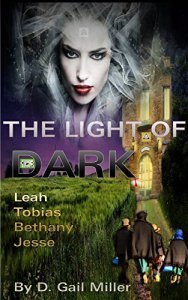
“What’s that you say? A piece of Christian fiction about members of an Amish community fighting against a world-wide conspiracy in the End Times? Count me in!” was exactly what I didn’t say when The Light of Dark boxset entered my ‘to review’ pile. But you know what? Despite a few issues, it won me over.
The Light of Dark box set consists of four books. The first one details the teenage years of Leah Albrecht and the strange discovery she makes whilst cleaning out a house for her Englisher neighbour, Ralph Martin. To start with, though, that’s the least of her worries. Leah is in love with a boy called Phillip but he is due to be married to their friend Abby in an arranged marriage. The personal story is interwoven with her investigation which suddenly takes a more sinister turn. Who exactly is Ralph Martin, and what is he involved in?
A few chapters in the story suddenly skips to twelve years later, which was a shame as I was enjoying the day-to-day life and ambitions of the characters, and Leah is now a broken woman having succumbed to witchcraft in order to try and save one of her sick children. She is excommunicated, shunned and eventually kills herself in front of her son Tobias. Before anyone complains about spoilers, all this is highlighted in the introduction.
The remaining three books follow her surviving children and have a similar pattern; there’s some romantic-based personal character drama amongst the young protagonists, which usually involves someone wanting to marry someone else out of reach. It’s then followed by the on-going plot about the cult of witches, missing Amish teenagers and a growing conspiracy about a group called the Lightbearers; a kind of Illuminati / Hydra variant. As the story progresses the conspiracy angle gets larger and wider until pretty much everyone in power seems to be implicated. In some ways, I would have preferred it if the danger was kept smaller and local, as it would have kept things grounded a bit whilst still providing plenty of drama. Still, that’s not what the book is about so that’s my problem.
With deeply religious main characters there’s always the danger that they can come across overly pious or ‘holier than thou’ to a secular audience. But, because of the great way they are written the Amish characters come across as genuine, and so well-meaning and good-natured that I found it impossible not to root for them. And because I wanted them to succeed, I cared for them and cared what happened to them. As things progress we are introduced to some side characters, including a cult member, a previously brain-washed pop singer and an FBI agent. All of whom have their own stories and roles to play within the greater narrative.
To me, the standout book was Bethany’s story, which has just the right mix of romance drama and peril with some exciting sections which had me on the edge of my seat (literally in this case, as I was on a plane at the time). Plus, the romance angle was flipped around a bit making it a bit different from the others.
By the time we get to Jesse’s story, world events start to kick off and the scope of the story widens into a much larger area. There are some good sequences here, but at this point things start to go a bit over the top and I felt it lost its way a bit.
One of the main problems I found is that every single person the protagonists meet seems to know exactly what’s going on, and imparts the information in one huge info-dump which is repeated at least twice per book. Although it could be argued that the characters need to know, from a reader’s point of view getting through the same thing eight-plus times can get a bit irritating. The conspiracy itself also starts to go a bit overboard, with more and more outlandish details and claims, where fewer might have worked better.
Still, by the time this became an issue I was so invested in the main characters that I was willing to go with it, which is a testament to the quality of the writing. It was also somewhat refreshing that in this day and age where many stories are about revenge and violence, that the characters were still trying to find the good in their enemies and were willing to forgive them.
There is one caveat emptor, however. As this is a Christian-based work of fiction there is a lot of religious musings and quotes of scripture from various characters (and, of course, a very pro-Christian view of the world). To me, this wasn’t an issue, but if you’re a fundamentalist atheist, for example, and get offended by such things, it might bother you and therefore you might want to look elsewhere (the blurb for the book clearly states it’s a Christian novel though so you only have yourself to blame in that case!).
In conclusion, I’d give The Light of Dark 3 ½ stars normally, but it gets an extra half for getting past my preconceptions and winning me over with its charming cast.
Rating: 4 / 5
Disclaimer and disclosure. I received a free copy of The Light of Dark in return for an honest review. All opinions are my own, and I am receiving no payment for the review, either by financial or review-swap means.


June 4, 2016
Book review: The Colony, by RMGilmour
The Colony, by RMGilmour
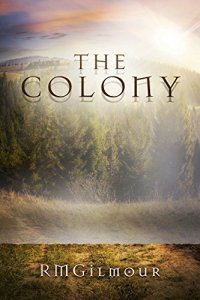
Lydia is a broken woman weighed down by grief and trauma, both mentally and physically. Then one day she starts hearing a voice in her head claiming to be a person called Jordan from another plane of existence. At first she dismisses it, but then it won’t go away and she feels strangely drawn to it, his presence making her feel whole again. After a while Jordan explains to Lydia that he can bring her to him, and before she knows it she’s on a strange world outside a walled city she can’t enter.
And she’s not the only one there; there’s a whole colony of people in fact, made up of people from different worlds and not all of them came willingly. But why are they there, why do they need to protect themselves at night, and will Lydia ever find Jordan so they can be together at last?
Colony is billed as a sci-fi romance, so it should come as no surprise that there is a substantial amount of angst and longing within its pages. If you’re not into that kind of thing, however, there’s still plenty of sci-fi ideas and action to see you through.
Lydia initially meets a man called Grid, a human colonist who shows her (and us) around the colony. It’s a good introduction to the world and Grid himself is a very interesting and conflicted character. Lydia’s relationship with Grid, a who’s been there quite a while, is a fairly odd one though (friends with cuddles I guess you could call it), and she sends him some very mixed signals throughout the book.
Lydia herself is an interesting character. Initially self-conscious about her appearance and how other people perceive her, she gains in mental strength as the story progresses as she is accepted and finds her place in the world. When there is nowhere to hide from yours and others’ feelings, the only way is forward.
The two other races (or at least alternative humans) are the Heart and the Rathe. The Heart are a Spartan-type warrior race, who constantly battle and train against one-another for status. This is exemplified the character Lena, who helps Lydia out and gives her inner strength. The other main Heart character is Haize, who is regarded in a strange light by her peers because she is a medic.
The Rathe are centuries ahead of Earth in developing advanced technology but didn’t pursue it as they saw the dangers, preferring to do things like creating food the old-fashioned way. Aleric, the main Rathe character, acts as Lydia’s guide and a go-between with her and the characters she meets from the city.
Colony is quite a long book and I feel it could have been made better with some trimming down. The first 15% or so of the book is made up of Lydia reflecting on her trauma and getting to know Jordan. While this is important for character development (Lydia is isolated by her own choice and about to be sectioned), there does seem quite a lot of repetition in this early section as they are basically either in her house or by the river.
Later on in the book there is a couple of chapters devoted to the warrior race the Heart and their battle training methods, which Lydia then has a go at. The problem with this is that whilst Lydia is gaining mental strength I didn’t think there was really a huge need for a Katniss-style (and / or whatever the main character in Divergent was called) montage section, especially as is isn’t really paid off later. I felt this could have been cut, or at least reduced. The story also pulls the ‘character thinks someone is dead but they’re not quite’ card more than once, and occasionally falls into the Lost method of storytelling by withholding things from the reader because it’s not time to know it yet. The characters do explain why certain information isn’t told, but it rang slightly hollow.
That said, there are some very exciting scenes in the story (the bait and chase scene springs to mind) and the third act races along at a pace, so much that I finished the last quarter of the book in one sitting. There are also quite a few plot twists and moments of revelation along the way which I enjoyed greatly (and won’t spoil here). The best twists in fiction are ones that are there in plain sight and these were handled very deftly I thought. There are also lots of good ideas on how the colony functions and the hidden price they all have to pay.
Colony is told in a first person perspective (well, 99% of it is anyway). I have to admit it’s not my personal favourite way of storytelling as although it adds a very personal touch, it tends to limit the scope and breadth of the narrative. We don’t really find out much about the city and its inhabitants, for example, apart from that they are given everything they need from a central computer. How they live day to day and why a lot of them seem so empty that they need to reach out to other worlds is left to our imagination. Still, this is just my personal choice and has no reflection on the final rating.
I enjoyed The Colony and I’d recommend it to science fiction fans looking for something a bit different, or to romance readers wanting a bit of a change of scene.
Rating: 4 / 5
Disclaimer and disclosure. This book was bought by me from Amazon.co.uk. All opinions are my own, and I am receiving no payment for the review, either by financial or review-swap means.





